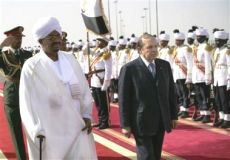At least 10 heads of state are skipping Arab League summit
March 27, 2006 (KHARTOUM) — At least 10 heads of state are skipping an Arab League summit that begins Tuesday, a blow to gathering many had hoped would tackle a series of major challenges facing the region, including Iraq and the creation of a Hamas-led Palestinian government.
 In light of the no-shows, the summit was likely to be shortened to one day instead of two, Arab diplomats in Khartoum said, speaking on condition of anonymity because the decision hadn’t been announced.
In light of the no-shows, the summit was likely to be shortened to one day instead of two, Arab diplomats in Khartoum said, speaking on condition of anonymity because the decision hadn’t been announced.
The absence of heavyweights such as Egyptian President Hosni Mubarak and Saudi Arabia’s King Abdullah — as well as the king of Jordan, most likely — promises a lackluster summit in a year where many had hoped to see serious efforts at dealing with regional troubles.
The U.S. State Department urged Arab leaders to “be as supportive as possible of the new Iraqi government” by sending ambassadors and economic assistance to Baghdad.
A resolution to be approved at the summit urges Arab countries to send ambassadors to Iraq, a key demand of the Iraqi government, but the low attendance could undermine the impact of such a call.
A main reason for no-shows was the venue, Sudan. Some of the absent leaders cited security concerns, others have political differences with the Sudanese government.
The U.S. government also asked leaders friendly to it to stay away to prevent a show of support for the Sudanese government, which is under international pressure to allow U.N. peacekeepers in the war-torn region of Darfur, said several Arab diplomats from countries whose heads of state were absent.
“Rarely has an Arab summit been held with as much fogginess as the Khartoum summit — assuming it will be completed despite the increasing number of no-shows,” wrote Ghassan Tueni, publisher of the leading Lebanese An-Nahar daily on Monday.
The annual meeting of the 22-member body is contending with complex issues involving Iraq’s future, Iran’s nuclear dispute and how to deal with a Hamas-led government in the Palestinian territories.
Sudan has sought to play down the absence of major leaders and has lined its streets with posters of the leaders and signs of welcome.
“Every Arab leader has his own circumstances, and we respect the circumstances which prevent any Arab leader from attending the summit,” Sudanese President Omar al-Bashir was quoted as saying by the local press.
The Arab League also dismissed the absences.
“This is not a problem,” said Ahmed bin Heli, assistant secretary-general of the league. He insisted those attending are mandated to take positions for their governments. “They act like their heads of state.”
Sudan, aware of its image as an unstable country, seems to have made efforts to prove it can provide security for the event.
Guards at the summit venue casually waved in people who set off metal detectors, but the heads of state and ministers seemed well protected.
Leaders were taken from the airport in convoys of bulletproof cars to a neighborhood of villas where they are staying, surrounded by up to 7,000 Sudanese forces, including members of the elite Presidential Guards. Snipers were visible on rooftops and helicopters flew overhead.
But the absences were still notable for their number. Most years, only a handful of leaders stay home, often due to illness. In 2003, at least 11 leaders stayed away as the summit came just before the launch of the Iraq war.
Egyptian officials said Mubarak was staying away after being advised by his senior top security and intelligence aides not to attend.
Mubarak hasn’t visited Sudan since the 1995 assassination attempt on his life in Addis Ababa, Ethiopia, which senior Sudanese officials were thought to have been behind. Relations between the two countries continue to be tense.
Saudi Arabia’s Abdullah was sending Crown Prince Sultan bin Abdul-Aziz in his place. Abdullah hasn’t attended a summit since 2003, when he had a public, televised spat with Libyan leader Muammar Gadhafi, who is attending the Khartoum summit.
Jordan’s King Abdullah II is also likely not to attend, said members of the Jordanian delegation, without providing an explanation.
Iraqi President Jalal Talabani was also staying home, apparently after being asked by political leaders to remain in Baghdad to try to keep the momentum of finalizing an agreement on forming an Iraqi government.
Others staying away included the leaders of Comoros and Somalia, Oman’s Sultan Qaboos, Morocco’s King Mohamed VI, Bahraini King Hamed bin Isa Al Khalifa, Tunisian President Zine El Abidine Ben Ali, who has accused Sudan of hosting Tunisian Islamic activists.
Foreign ministers drew up a set of draft resolutions to be approved by the heads of states.
The resolution on Iraq pledges that Arab countries will open embassies as soon as possible – though it gave no timeframe. Another promises that Arabs will continue funding the Palestinian Authority despite U.S. calls for a halt of financial aid to a government led by the radical Hamas group.
(ST/AP)
